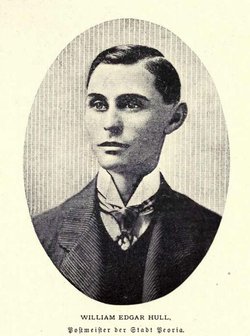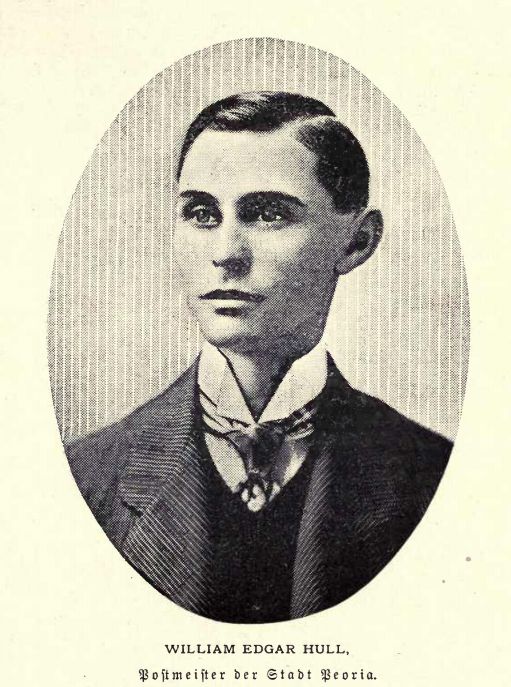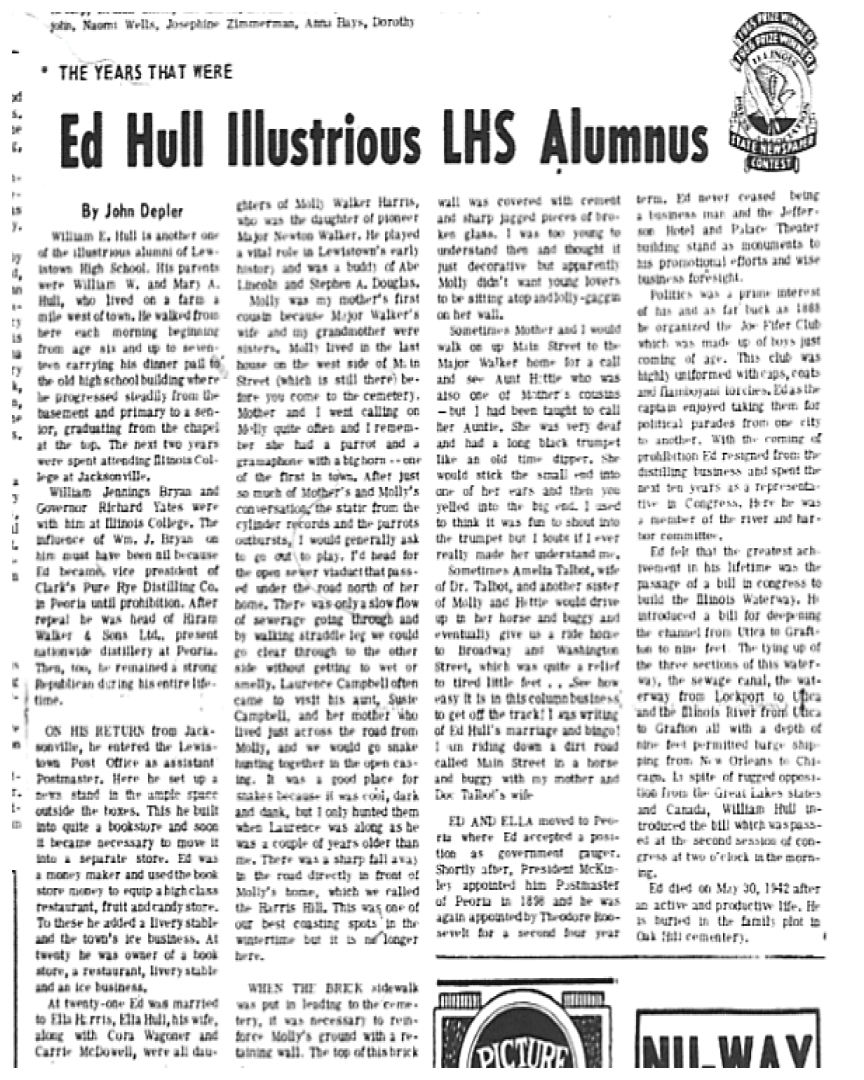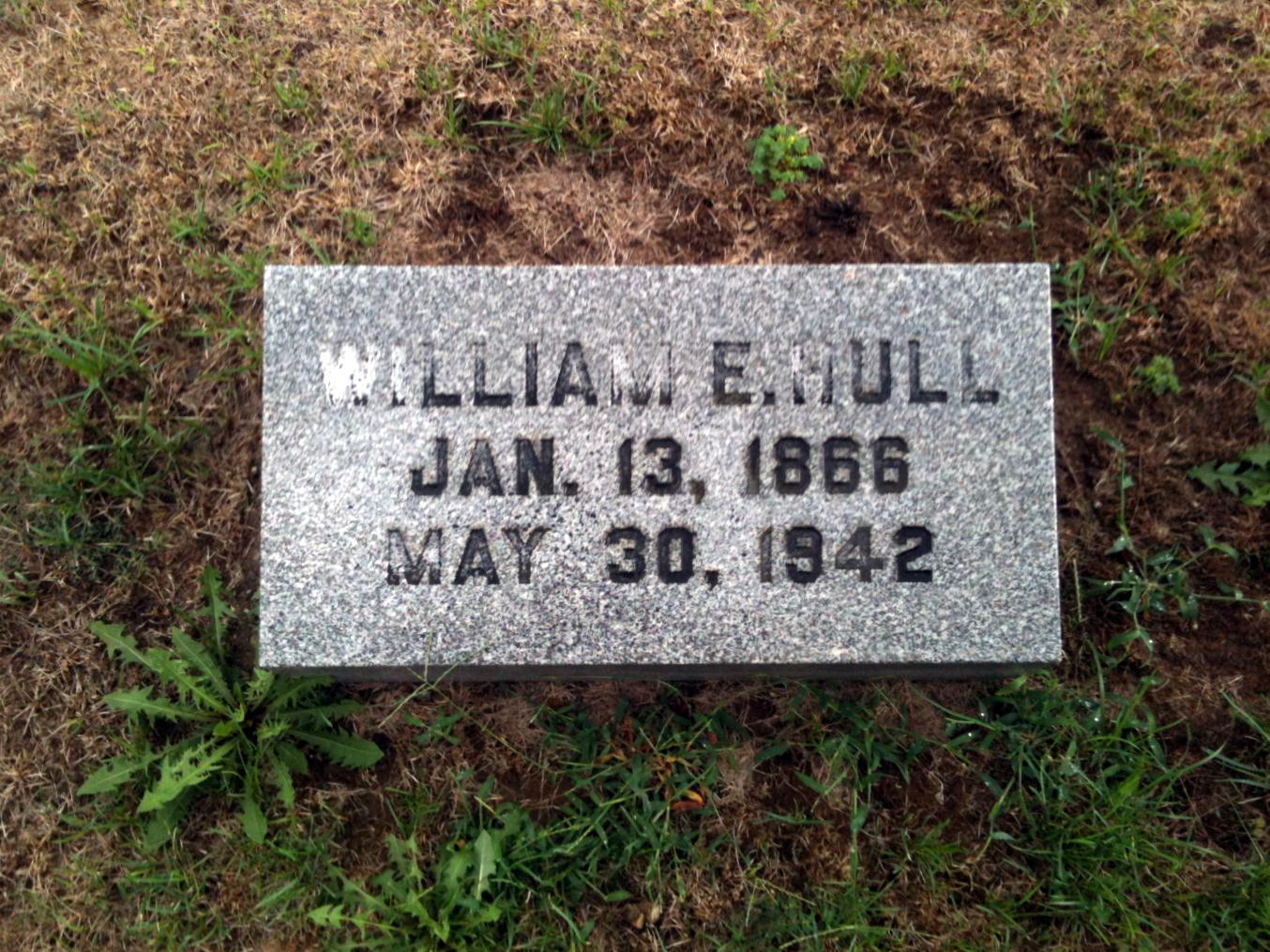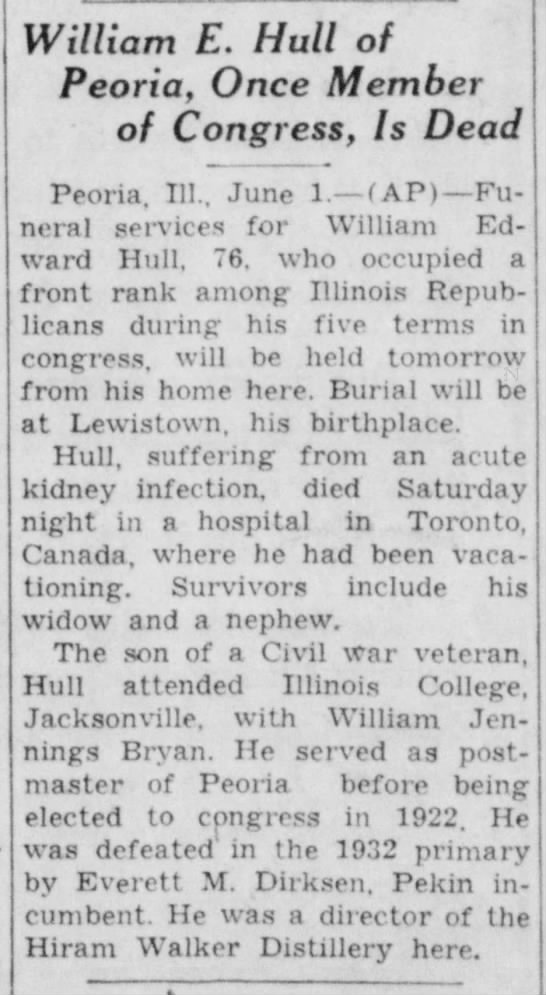The ancestry of the Hull family dates back to Captain Hull, of Lake Erie fame during the War of 1812. Philip Hull, William E. Hull's grandfather, removed with his wife and four children in the early '40s from Licking County, Ohio, and settled near Smithfield, Fulton County, Illinois, where he opened a farm, on the corner of which he built the first log school-house in that section. This house, known as the "Hull school-house," became famous as a place for country meetings and debates, a frame building now occupying the site of the original log structure. Later Mr. Hull removed to the vicinity of Lewistown, where his oldest son, Dr. Alexander Hull, began practice and became prominent as a physician. William Wesley Hull, the youngest son, enlisted in the army in 1861 and became Captain of Company H, Seventeenth Illinois Volunteer; was mustered out at the close of his term of service, and returning to Lewistown resided there until his death. Dr. Hull was a prominent figure in the Democratic party, while Captain Hull was equally prominent as a Republican. Although the closest of friends socially, the two brothers were strongly antagonistic politically, their names on one or two occasions appearing on their respective party tickets as opposing candidates for county offices. Captain Hull was widely known as a shrewd, careful and zealous politician, who exerted a strong influence in his Congressional District and enjoyed the respect of his party and the public.
William Edgar Hull was reared on his father's farm, and after taking a course in the Lewistown High School, entered the classical department of Illinois College, at Jacksonville. In 1883 he returned to Lewistown and soon began taking an active part in Republican politics, while still a boy of seventeen being recognized as a power at the polls. In 1884 he became Assistant Postmaster at Lewistown, remaining two years, when he resigned to enter into business for himself. During the campaign of 1888 he took a leading part in the organization of a "Young Men's Republican Club," composed entirely of young men about to cast their first votes for President at the election of that year. This club—in honor of the Republican candidate for Governor, named "The Joe Fifer Club"—became well known and gave to Mr. Hull a wide reputation as a Republican worker and organizer.
The election of Benjamin Harrison to the Presidency in 1888 changed the complexion of affairs in the Peoria District; the Hon. Julius S. Starr was appointed Collector of Internal Revenue for the Fifth District, and Mr. Hull, having been selected by the Republicans of Fulton County for that purpose, was appointed a Government Gauger early in 1890, and soon after took up his residence in Peoria, which has been his home continuously ever since. Zealous in the discharge of his official duties, he soon became an important factor in city politics, and at one time had the credit of turning the old Third Ward—which had been strongly Democratic—into a Republican ward; a result attributed largely to his energy and hard work. In 1894 he became the Secretary of the Peoria County Republican Central Committee, also serving in a like capacity for the Fourteenth Congressional District, and threw into the campaign the zeal and energy so characteristic of his political career. The campaign culminated in a great Republican victory—every candidate on the Republican County ticket, with one single exception, being elected, while Mr. Graff was chosen Representative in Congress by a majority of more than 3,000 in a district which had been carved out with the intention of making it surely Democratic. In 1896—this being the presidential year—Mr. Hull again served as Secretary of the Republican County Committee, taking up the work on broader lines than ever before and with equal success. The successful outcome of these two campaigns gave him increased prominence, which was recognized in his appointment by President McKinley, on March 23, 1898, to the position of Postmaster of the city of Peoria, and the business capacity which he has displayed in the management of the office has been recognized (March 14, 1902) in his appointment by President Roosevelt for a second term of four years. During his incumbency many improvements and betterments have been introduced, including increase of the carrier and clerical force, the establishment of substations and the annexation of suburban towns, giving to the latter the benefit of a free-delivery service.
Since coming to Peoria Mr. Hull has been identified with a number of important business enterprises, one of these being the Peoria Livery Company, of which he was the original promoter and organizer, while another is the Messrs. Clarke Brothers & Co.'s great distilling interest, of which he is the general manager.
Mr. Hull was married, on February 27, 1889, in Lewistown, to Miss Ella Harris, daughter of Edwin Harris, at that time President of the Fulton County Narrow-Gauge Railway, and a prominent figure in connection with the business interests of Fulton County. Mrs. Hull was born February 15, 1867, and is a granddaughter of the late Newton Walker, one of the pioneers of Illinois, and an intimate personal friend of Abraham Lincoln. (Historical Encyclopedia of Illinois and History of Peoria County, 1902, page 316, submitted by Janine Crandell)
The ancestry of the Hull family dates back to Captain Hull, of Lake Erie fame during the War of 1812. Philip Hull, William E. Hull's grandfather, removed with his wife and four children in the early '40s from Licking County, Ohio, and settled near Smithfield, Fulton County, Illinois, where he opened a farm, on the corner of which he built the first log school-house in that section. This house, known as the "Hull school-house," became famous as a place for country meetings and debates, a frame building now occupying the site of the original log structure. Later Mr. Hull removed to the vicinity of Lewistown, where his oldest son, Dr. Alexander Hull, began practice and became prominent as a physician. William Wesley Hull, the youngest son, enlisted in the army in 1861 and became Captain of Company H, Seventeenth Illinois Volunteer; was mustered out at the close of his term of service, and returning to Lewistown resided there until his death. Dr. Hull was a prominent figure in the Democratic party, while Captain Hull was equally prominent as a Republican. Although the closest of friends socially, the two brothers were strongly antagonistic politically, their names on one or two occasions appearing on their respective party tickets as opposing candidates for county offices. Captain Hull was widely known as a shrewd, careful and zealous politician, who exerted a strong influence in his Congressional District and enjoyed the respect of his party and the public.
William Edgar Hull was reared on his father's farm, and after taking a course in the Lewistown High School, entered the classical department of Illinois College, at Jacksonville. In 1883 he returned to Lewistown and soon began taking an active part in Republican politics, while still a boy of seventeen being recognized as a power at the polls. In 1884 he became Assistant Postmaster at Lewistown, remaining two years, when he resigned to enter into business for himself. During the campaign of 1888 he took a leading part in the organization of a "Young Men's Republican Club," composed entirely of young men about to cast their first votes for President at the election of that year. This club—in honor of the Republican candidate for Governor, named "The Joe Fifer Club"—became well known and gave to Mr. Hull a wide reputation as a Republican worker and organizer.
The election of Benjamin Harrison to the Presidency in 1888 changed the complexion of affairs in the Peoria District; the Hon. Julius S. Starr was appointed Collector of Internal Revenue for the Fifth District, and Mr. Hull, having been selected by the Republicans of Fulton County for that purpose, was appointed a Government Gauger early in 1890, and soon after took up his residence in Peoria, which has been his home continuously ever since. Zealous in the discharge of his official duties, he soon became an important factor in city politics, and at one time had the credit of turning the old Third Ward—which had been strongly Democratic—into a Republican ward; a result attributed largely to his energy and hard work. In 1894 he became the Secretary of the Peoria County Republican Central Committee, also serving in a like capacity for the Fourteenth Congressional District, and threw into the campaign the zeal and energy so characteristic of his political career. The campaign culminated in a great Republican victory—every candidate on the Republican County ticket, with one single exception, being elected, while Mr. Graff was chosen Representative in Congress by a majority of more than 3,000 in a district which had been carved out with the intention of making it surely Democratic. In 1896—this being the presidential year—Mr. Hull again served as Secretary of the Republican County Committee, taking up the work on broader lines than ever before and with equal success. The successful outcome of these two campaigns gave him increased prominence, which was recognized in his appointment by President McKinley, on March 23, 1898, to the position of Postmaster of the city of Peoria, and the business capacity which he has displayed in the management of the office has been recognized (March 14, 1902) in his appointment by President Roosevelt for a second term of four years. During his incumbency many improvements and betterments have been introduced, including increase of the carrier and clerical force, the establishment of substations and the annexation of suburban towns, giving to the latter the benefit of a free-delivery service.
Since coming to Peoria Mr. Hull has been identified with a number of important business enterprises, one of these being the Peoria Livery Company, of which he was the original promoter and organizer, while another is the Messrs. Clarke Brothers & Co.'s great distilling interest, of which he is the general manager.
Mr. Hull was married, on February 27, 1889, in Lewistown, to Miss Ella Harris, daughter of Edwin Harris, at that time President of the Fulton County Narrow-Gauge Railway, and a prominent figure in connection with the business interests of Fulton County. Mrs. Hull was born February 15, 1867, and is a granddaughter of the late Newton Walker, one of the pioneers of Illinois, and an intimate personal friend of Abraham Lincoln. (Historical Encyclopedia of Illinois and History of Peoria County, 1902, page 316, submitted by Janine Crandell)
Family Members
Sponsored by Ancestry
Advertisement
Advertisement
